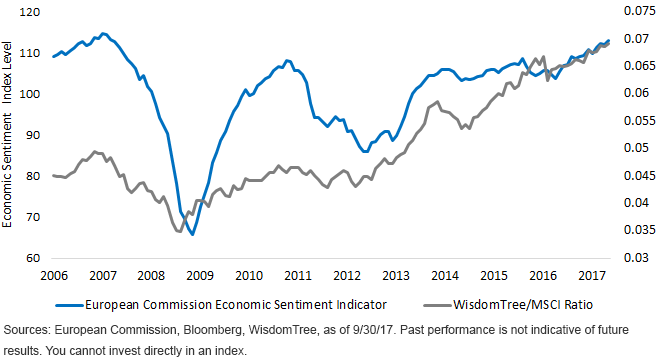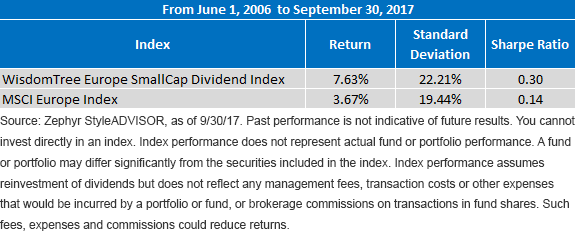With European Sentiment Up, Market Cap Focus Should Be Down


The first three quarters of 2017 have started to see the long-awaited passing of the baton from U.S. markets to overseas markets. Year-to-date through September 30, the MSCI Europe, Japan and EM Indexes all outpaced the S&P 500.1 Given the younger ages of their respective rallies (consider this: if the U.S. bull market that was born in March 2009 were a person, it would have just started third grade), valuations generally remain more attractive in the international markets.
While there is reason for optimism in all three international equity regions, for the purposes of this blog post, we’ll focus on Europe.
Investors have added $14.4 billion to broad-based European ETFs in 2017,2 and it is easy to see why. Looking beyond the market-friendly election results across the region, sentiment indicators reached their highest levels in more than a decade. Encouragingly, measures of leading indicators have also hit their highest levels since before the financial crisis.3 Couple these economic developments with a compelling valuation opportunity, and one can reasonably ask—what’s not to like?
Perhaps the only thing not to like could be the vehicles in which many investors are allocating.
European Stocks Not Reflective of European Economies
Unlike the U.S. market (where the S&P 500 derives 62% of its underlying revenue from within the U.S.), the European market tends to be more export-oriented, with the MSCI Europe Index deriving only 44% of its underlying revenue from within broad Europe.4 So if investors are turning optimistic on Europe because of what is happening on the economic front, wouldn’t a smarter investment be something more closely tied to the economies themselves?
We’ve written in the past about how European small caps conduct much more of their business in Europe, and our Europe SmallCap Dividend Index derives 74% of its revenues from within Europe5 - 30% more than the MSCI Europe Index. Given its local ties, it should be no surprise that the performance of the WisdomTree Index performance relative to the MSCI index is closely tied to economic sentiment.
Strong Correlation between Sentiment and Small-Cap Relative Performance

There is a 0.58 correlation between the European Commission’s Economic Sentiment Indicator and the performance of the WisdomTree Index compared to the MSCI Europe Index. On the surface, this may sound intuitive: Small caps outperform large caps when sentiment is rising (and vice versa). However, for bullish investors allocating to Europe, this message appears to be getting lost in translation.
Of the $14.4 billion that has gone into European ETFs this year, only $278 million—less than 2%!—has gone into small-cap strategies.
If investors believe Europe is trending upward, wouldn’t a targeted approach be preferred to a more globally reliant one? Clearly, there has been a misalignment between thesis and implementation.
The “Problem” with Small Caps
The natural criticism to this thesis may be that investors are worried about extra volatility typically associated with small caps. Admittedly, this is true—European small caps have historically been more volatile than large caps. However, the incremental returns have more than made up for the incremental volatility.
Since its inception, the WisdomTree Europe SmallCap Dividend Index has not only had more than double the total returns of the MSCI Europe Index, it has had more than double the risk-adjusted returns of the MSCI Europe Index.

Since small caps are closely tied to the local economy, the performance of the small-cap Index is even more impressive given the backdrop of middling—at best—economic conditions in Europe since 2006. If the European economies sustain their upward momentum, the potential for small-cap outperformance could certainly continue from here.
1Source: Bloomberg, as of 9/30/17.
2Source: Bloomberg, as of 9/30/17.
3Source: DZ Bank, 10/2/17.
4Source: FactSet, as of 9/30/17.
5Source: FactSet, as of 9/30/17.
Important Risks Related to this Article
Investments focused in Europe increase the impact of events and developments associated with the region, which can adversely affect performance.
Investments focusing on certain sectors and/or smaller companies increase their vulnerability to any single economic or regulatory development.


